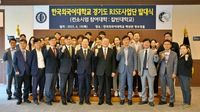Yongin City is stepping up its game in the semiconductor industry by forging a powerful alliance with six prominent universities, aiming to nurture the next generation of semiconductor talent. On June 19, 2025, the city signed a groundbreaking memorandum of understanding (MOU) with Hankuk University of Foreign Studies, Kangnam University, Kyung Hee University, Dankook University, Myongji University, and Yongin University of Arts and Sciences. This collaboration was publicly announced the following day, signaling a new chapter in regional industry-academia cooperation.
This partnership is not just a standalone event but a direct follow-up to the "Gov-Academia Cooperation Council Kick-off Meeting" held on May 28, 2025. The participating institutions and Yongin City have committed to forming a dedicated 'Gov-Academia Cooperation Council.' Their shared mission: to jointly cultivate semiconductor professionals equipped with the skills needed in various sectors of this rapidly evolving industry.
The strategy behind this alliance is multifaceted. It includes fostering inter-university collaboration, linking projects with semiconductor high schools, and coordinating joint responses to national and provincial funding opportunities. By pooling resources and expertise, the council aims to launch practical cooperative projects that will directly impact the semiconductor workforce pipeline.
Mayor Lee Sang-il of Yongin emphasized the critical importance of this initiative. "The semiconductor industry is booming here in Yongin," he said. "We must work hand in hand with universities to continuously nurture and supply talented individuals. If the universities come up with innovative project ideas, we will provide full support." His words underscore the city’s commitment to making this collaboration a catalyst for sustained growth and innovation.
Meanwhile, Hankuk University of Foreign Studies (HUFS) marked a significant milestone related to this endeavor by holding the 'Gyeonggi-do RISE Business Unit Launch Ceremony' on June 20, 2025. HUFS is taking a leading role in fostering specialized talent through this initiative, which zeroes in on three key areas: semiconductor materials, parts, and equipment; healthcare and welfare; and smart manufacturing.
The launch event was attended by around 50 participants, including HUFS President Park Jung-woon, industry representatives, consortium members, faculty, and students. The university's RISE Business Unit has outlined ambitious core tasks: nurturing global regional innovation talent, establishing a sustainable industry-academia cooperation model, contributing meaningfully to the local community, and creating a long-term development framework for the university itself.
At the ceremony, President Park expressed his vision for the project. He said, "The Gyeonggi-do RISE project is expected to act as a catalyst, bringing together the region, universities, industries, and citizens to open the future as a shared community. Even after the project's scheduled conclusion in 2030, I hope it will evolve into a sustainable regional innovation platform." This statement highlights the initiative’s forward-looking approach, aiming not just for immediate results but for lasting impact.
Both Yongin City’s MOU and HUFS’s RISE project exemplify a broader trend in South Korea: the deepening integration of government, academia, and industry to bolster competitiveness in high-tech sectors. The semiconductor industry, being a pillar of national economic strength, demands a highly skilled workforce. This coalition seeks to meet that demand by leveraging the unique strengths of each university and aligning them with regional and national priorities.
In practical terms, the alliance will focus on creating joint academic programs, facilitating research collaborations, and developing pathways that connect university education with semiconductor high schools. Moreover, the group plans to actively pursue government and provincial grants to fund these initiatives, ensuring that financial support matches their ambitious goals.
The timing of these efforts is crucial. With global semiconductor demand surging and technological advancements accelerating, regions like Yongin are positioning themselves as innovation hubs. By cultivating talent locally through coordinated efforts, the city and its academic partners aim to reduce reliance on external sources and build a self-sustaining ecosystem.
Furthermore, the RISE Business Unit’s emphasis on a government-industry-academia alliance is a strategic move to create a virtuous cycle of innovation. Education and research activities will be closely linked with industry needs, ensuring that graduates possess relevant skills and that research outputs can be swiftly translated into commercial applications.
The involvement of healthcare and smart manufacturing sectors alongside semiconductors in the RISE project also reflects a holistic approach to regional development. These fields often intersect with semiconductor technology, especially in areas like medical devices and automation, broadening the scope and impact of the initiative.
Local community engagement is another pillar of the strategy. By contributing to the region’s social and economic fabric, the universities and city government aim to foster a sense of shared purpose and mutual benefit among stakeholders.
Yongin’s approach could serve as a model for other regions seeking to enhance their technological prowess through collaborative frameworks. The city’s proactive stance, combined with the universities’ academic excellence and industry ties, creates fertile ground for nurturing the semiconductor experts of tomorrow.
In sum, the alliance between Yongin City and its six universities, coupled with the launch of the Gyeonggi-do RISE Business Unit at Hankuk University of Foreign Studies, marks a significant stride toward building a robust semiconductor talent pipeline. This initiative not only addresses immediate workforce needs but also lays the groundwork for sustained innovation and regional prosperity well into the future.

